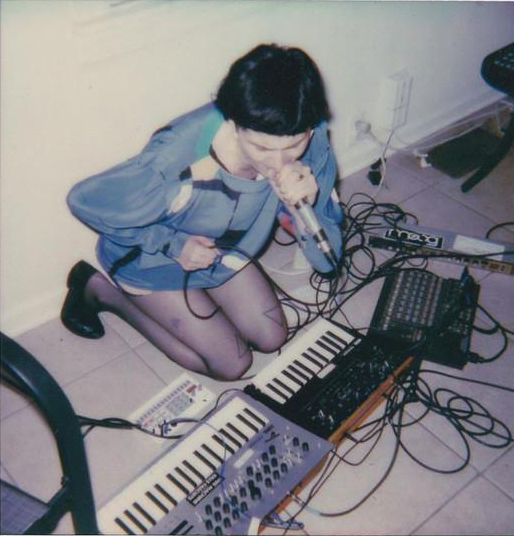By Keith Walsh
The gritty, dark futurism of Nail Club’s lo-fi electronic music belongs in films. The new album Mise en Abyme combines grungy synth riffs and dirty beats with cryptic vocal performances, in a dramatic mix. And that’s perfect, because the woman behind the project, Sara Storm, makes music for her friends’ films, and will graduate in the fall with a degree in Criminal Theory that she will put to use in an unconventional way.
Jumping to conclusions, I asked Storm, who resides in New Orleans, if she was planning on becoming a member of the police force after completing her degree in Criminal Theory. “No, not at all,” Storm said. “My theories are all on sex crimes, and it’s really funny because I get my bachelor’s in the fall, but then I’m going to go to film school after that and kind of tie in what I’ve learned from Criminal Theory to Erotic Thriller Cinema.” I laughed awkwardly as Storm told me this.
Isn’t that what Brian DePalma is all about? “Oh absolutely,” she said. “All of his films, I love that he has that female gaze. There’s always a focus on a woman, and whether she’s going through a rape or some kind of sex crime that’s really evident in all of his work.” I asked if she was a fan of Quentin Tarantino. “No, not at all! I actually avoid all of his work, and watch the things that inspired him instead.”
Turns out that naming one director who gets everything right is not an easy task. “A favorite director would be a very tough thing, “ Storm said. “Because I think it changes over time. Right now I’m reading far more than watching film.” I asked if she finds the Marvel films enjoyable? “Anything contemporary is really hard to me to sit with. Maybe in twenty years.”
Storm’s music has already appeared in films by Lynn Stevens (Young Man Blues, The Downtime, Killer Of Women, and Nero Nava (One Person). Of Stevens, Storm said: “The last film we worked on was Killer of Women and when asked to create a soundtrack, I found in my boxes of recordings three tapes of music I made during bouts of insomnia. Very harsh tones and loops and Lynn cherished these tracks and the music sets the tone of the film, which is slightly based on BTK, Dennis Rader. Lynn Stevens is currently working on a new film which will also have Nail Club tracks as well. I do love having friends who ask for music for their films and I try my best to create things for them, but they never direct me in any way. So that complete freedom to make things is something I’m thankful for.”
An artist’s textual diet says a lot about their creative output. It’s telling that Storm, a self proclaimed hermit, reads a lot of critical theory and is watching documentaries lately. Fictional plotlines aren’t necessarily on Storm’s TV these days. “I’ve been watching a lot of Lee Grant’s documentaries that were made in the late 70s,” she said. “Those are all on Criterion right now. Each one is so different, like she made one that’s called What Sex Am I? I mean, in the late 70s to talk about transgender so openly. And then she had another one, which is called Battered about women who were battered and took violence into their own hands as retaliation.”
Fortunately, the lyrics on Mise en Abyme are not troubled with such darkness. Storm explained: “The new album, lyrically, is the possibility of relationships starting, and having my doubts, that they’re going to and inevitably, none of them started. Actually the person who painted the cover of the record–The title of it is called Men And Intrusion. (by Christopher Michael Hefner) I thought, ‘Oh my God’, that fits so perfectly because in a sense while I was making that record, that’s probably what I look like. Like, ‘oh, here’s all these possibilities of starting, you know, something intimate,’ but when you have your doubts, you know, that that’s going to hold you back from anything actually happening.”
Storm’s Gear
Storm says she finds inspiration in two Korg analog synthesizers, the Minilogue and the Monologue. “I didn’t really have a sequencer before I had those,” Storm told me. “So it’s just really changed how I was working on things. I appreciate how you can just start playing them and create anything.” Storm records her songs onto a Tascam 4 Track cassette recorder then converts them to digital in Audacity for distribution.
Her drum machine is also a Korg, the KR55, but recently Storm has switched to a Korg Volca with samples from the legendary Roland TR-808. Distortion and reverb become instruments in lo-fi music, to the point where Storm’s lyrics aren’t intelligible on the new album at all. And that’s by design, affording the artist a degree of privacy.
“In a sense, it’s almost ontological,” said Storm. The idea that it’s present but it’s in the past as well. But I think when I’m writing songs, lyrically, everything comes from my diary. So I don’t actually set out, like, I’ll write the music for it and then turn to my diary to kind of express. It’s not something that’s happening in the present. That’s why I use that.”
Though the pandemic has prevented Storm and Nail Club from performing lately, in the past she has put on solo shows that are intimate and cathartic that are similar in texture to performances by Lower Tar. “I tend to journal the things that I wouldn’t say to people,” she said, “so usually playing shows is really exhausting for me, because I feel like I’m saying things, almost like I’m sh#@tting on a crowd. Saying things that I couldn’t necessarily say to a person, like they’re letters that I would’ve sent, but didn’t send to them. People are like ‘oh I really love this,’ and I say ‘oh that was actually really painful to do.’ In a way that’s why I don’t want people to know what I’m saying,”
A Tonal Experience
Puzzling the text out of Storm’s music is all about the context, not only due to the fact that the lyrics are unintelligible, but also because her badass attitude is not only tough, it’s intellectual. For Storm, songs are a uniquely convenient medium of expression. “It’s the opposite of writing a book I guess,” she said. “I mean when you read a book you’re kind of hallucinating, but when you listen to a song, it maybe catches you in a different way and inspires a moment versus reading a book. You’re kind of stuck there for hours with the same waiting for you know, the next chapter. What’s going to happen next? What’s going to happen next versus music? It’s a tonal (experience). I would love to be able to publish writing that I have but I think making music is so much easier to get my point across as far as feelings.”
“I read a lot of critical theory and I think it inspires some projects. I have another project called Latex Cop, so I put a lot of lyrics into that project about critical theory and crime. Versus Nail Club is definitely more a personal project of me trying to go through, you know, bad, bad relationships.”
Nail Club On Bandcamp
Latex Cop On Bandcamp
finis

